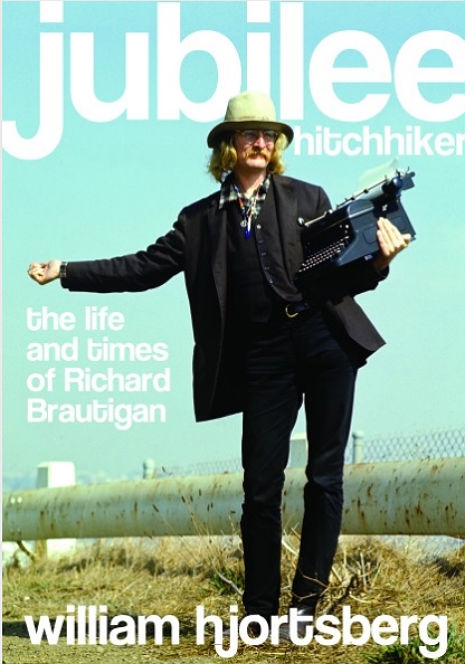
On the occasion of the publication of William Hjortsberg’s extraordinary 900 page biography of Richard Brautigan, Jubilee Hitchhiker, I am sharing something I posted awhile ago on Dangerous Minds:
“I was 15 when I first read a book by Richard Brautigan. It was called A Confederate General From Big Sur . I borrowed the book from my friend Joseph, a free spirited guy two years older than me who had a beard and rolled his own cigarettes. Though he looked like one, Joseph wasn’t a hippie. Hippies were part of a movement and Joseph wasn’t a joiner. In the small town in Virgina where we grew up, Joseph was completely his own man, a suburban teenage Zen monk who seemed ancient at the age of 17. It made perfect sense that he would be the guy to turn me on to Brautigan. They shared common traits: a clarity of mind, a sharp sense of humor and a deep love for language. Joseph kept a notebook with him at all times in which he wrote short stories, poems and haiku.
In this moment of recalling Joseph, I am convinced he was as close to being enlightened as any teenager could be in America in 1966. I wonder where he is today and what he’s reading.
Joseph, Brautigan, Jack Kerouac and The Doors were my saviors in the year of the Summer Of Love. I was stuck in the suburbs, surrounded by jocks and greasers, completely alone in my world of beatnik books and a meerschaum pipe full of banana peel. It was the year I read Brautigan’s second book Trout Fishing In America and the year that I left home for San Francisco. Joseph was there and I needed to make the connection with the Bodhisattva of the ‘burbs.
Those were the days when a book or a record album could change your life. If literature had a Beatles, its name was Richard Brautigan. It comes as no surprise that John Lennon was a Brautigan fan. They both had a whimsical point of view that started in the square inch field and expanded into the cosmos.
In 1968, I lived inside of a parachute inside of a dance hall in a ghost town near Los Gatos, California. It was my summer of In Watermelon Sugar. I read that magical book repeatedly (my psychedelic New Testament) and lived a simple life of bathing in waterfalls, eating brown rice and scarfing down countless tabs of Benzedrine (in honor of my hero Jack Kerouac) while trying to write with the ease and purity of Brautigan. I discovered that ease ain’t easy (particularly when you’re wired to the gills) and purity is near impossible. Really good writers make writing seem so natural that we all think we can do it. And then we try and soon discover just how hard it is to take energy from where you get it through the word to the reader without losing any immediacy in the process of transference. Brautigan’s poems and prose had this uncanny ability to gently slap you upside the head while maintaining a Basho-like quality of disappearing into what is being described - you saw the words become transparent as they melted into watermelon sugar. Watermelon sugar was Brautigan’s river Tao, a sweet subtle liquid that flowed through the pink flesh of our being.
William Carlos Williams famously wrote “no ideas but in things” and embodied that thought in poems like “The Red Wheelbarrow.” Brautigan wrote from a similar point of view - a kind of American Zen that was ordinary and transcendental, modern and prophetic…
I like to think (and
the sooner the better!)
of a cybernetic meadow
where mammels and computers
live together in mutually
programming harmony
like pure water
touching clear sky.
One of the things that was most compelling and inspiring for a young would-be writer like myself about Brautigan’s books were their covers. With every new book that Richard published there was always an attractive bohemian woman on the cover. It was as though Richard was sending a message to all the reclusive teenybopper poets in the world that said “write poetry and you will get laid.” And it was true. I would sit in the Mediterranean Cafe on Telegraph Ave. in Berkeley with my journal unfolded before me and invariably a young flower child would approach and ask if I were a poet. A response of “yes” would often lead to a fuck fest in my attic apartment on Channing Way. In the sixties being an artist/intellectual had the same aphrodisiac qualities associated with cocaine and Rolex watches in the 80s. Being smart was sexy.
For many of us, Brautigan was a door into a consciousness that was liberating in its playfulness and here and nowness. Reading Brautigan is like taking a pure hit of oxygen. Things sparkle. There is a sense of boundless delight and eroticism in his prose and poetry - a promise of the unspeakable, where language transcends itself.
Brautigan, now more than ever.” February 2, 2011.
You can purchase Jubilee Hitchhiker here. If you’re a Brautigan fan, you’ll find it an immersive and deeply satisfying trip. It took Hjortsberg, who knew Brautigan well, 20 years to write the book and during his research he discovered unpublished Brautigan writings that had been locked in a safe-deposit box in Eugene, Oregon for 30 years. This is a gift from the poetry gods.
The following recordings of Brautigan reading were intended to be released on Zapple records, a spinoff of The Beatles Apple label. But the project was never fully realized. Harvest Records released them as Listening To Brautigan in 1973.





